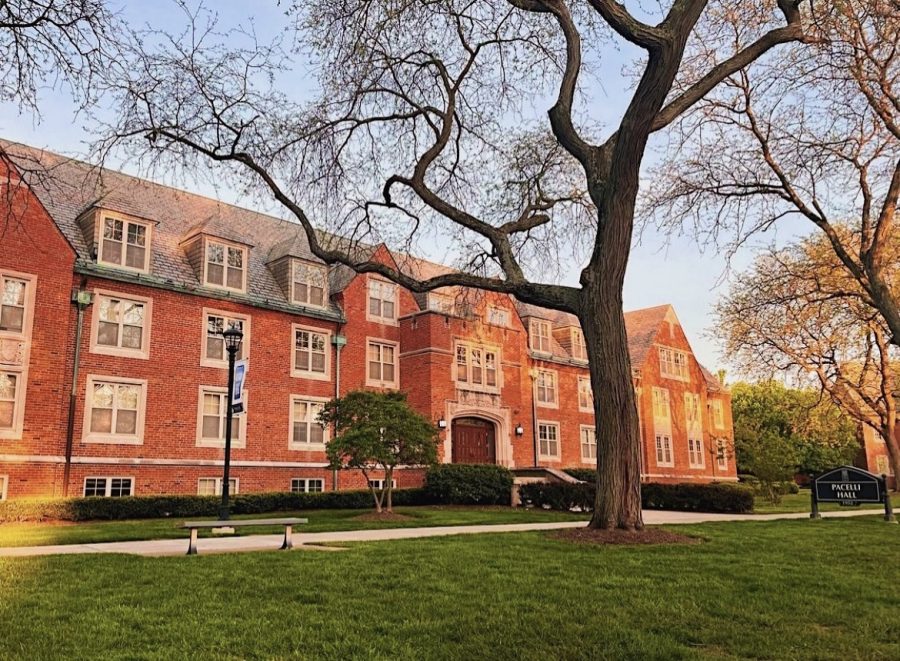First-Years Respond to Three-Year Living Requirement
Staff reporter Allison Foos talked with first-year students to hear their thoughts on the new living requirement
Dec 8, 2022
John Carroll has recently declared a three-year on-campus living requirement for all students who enter in the Class of 2026 and beyond. Previously, there was only a two-year requirement which is common among many universities such as Baldwin Wallace and Mount Union. This change in living requirements has been a hot topic discussion on campus ever since its reveal. Unfortunately for JCU, the response appears to be mostly negative.
Many students are excited about the freedom that comes with moving to college, but the three-year on-campus living requirement seems to be taking away some of that freedom. Some members of the class of 2026 are expressing their resentment of this new regulation.
“I wish it was only two years because some people want independence away from college and want their own space as well,” said Kathryn Sipe ’26. Houses typically have more space than dorms including a kitchen and living area and students often have their own bedrooms when they move into off-campus houses. After living in a dorm for a couple years, houses are usually very appealing to students.
Lia Rhodes ‘26, a first-year student living on campus in Hamlin Hall, stated that she was unaware of the three-year living requirement before accepting her admission to JCU.
“I wish I knew about it. I think it’s my right if I’m paying the money to come here, I deserve to know about the three-year living requirement,” Rhodes told The Carroll News.
It is unclear how explicitly the change in regulation was allocated and when it was officially posted as some students knew about it and others did not before submitting their deposits. JCU’s Residence Life Webpage currently states that students entering the 2022-23 school year have a three-year on-campus living requirement. However, after examining JCU Resident Life’s Instagram page, it is clear that nothing was posted about the change in living requirements.
Other students have stated that they don’t mind living on campus but they would still like to see some changes in residence life. “I would like to see more safety, such as double security on doors. For example, in Hamlin, we have double security tap-ins with our student IDs and I’d like to see that on all the dorms,” said Rhodes.
Hopeful for new opportunities, Chris Stosio ’26 feels that the three-year requirement could bring some positive outcomes to JCU.
“I think living on campus longer could bring a greater sense of community,” Stosio told The Carroll News. “There will be more people around for things like club meetings and student events. It could even have a benefit as small as seeing more friends in the caf.”
Near the end of the 2021-2022 school year, JCU released plans for future on-campus apartments near the stores and restaurants in front of campus. If this plan holds true, it could be an accommodating solution for the students who are required to live on campus for longer than two years.
Undoubtedly, living in a dorm has its benefits. Dorms are close to campus, they don’t require students to have a car, students don’t have to cook or pay separate utility bills. However, living in a house has many benefits as well. Houses have more space, students have more food options since they can cook for themselves and the bathrooms are much more private than residence hall communal bathrooms.
Cost is a big factor between on vs. off-campus housing as well. Depending on the location and size of a particular off-campus house, the cost could be less than living on-campus. When living in a house, students don’t have to have a meal plan which can be a big money-saver. However, with the cost of rent and utilities, some houses cost more than room and board on campus.
Many upperclassmen are expressing their relief for not being included in the three-year requirement.
“I’m really thankful that I’m not included in this living requirement. I think this is disadvantaging kids from experiencing what it’s like to live in a house on their own. Even if JCU builds apartments on campus, students will miss out on a crucial part of their life. They will be losing core memories that they would make from living in an off-campus house and learning how to manage being fully on their own,” said Nicole Lock ’25.
The backlash from the three-year regulation leaves students wondering what the next step will be from JCU. Will they revoke the three-year requirement or will they push it even further?













